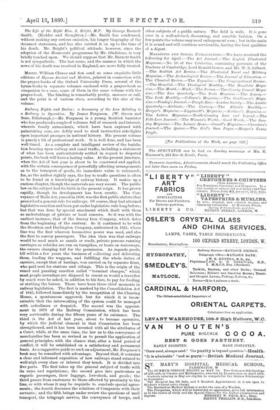Railway Rights and Duties : a Summary of the Law
Relating to a Railway in Operation. By James Ferguson. (W. Green and Sons, Edinburgh.)—Mr. Ferguson is a young Scottish barrister who has produced a couple of volumes full of research and interest, wherein family antecedents, which have been explored with painstaking care, are deftly used to shed instructive side-lights upon important passages in national history. His present volume is purely a bit of professional work. It is well done, and has been well timed. As a complete and intelligent review of the legisla- tion bearing upon railway and canal traffic, including a statement of what has been authoritatively settled in regard to disputed points, the book will have a lasting value. At the present juncture, when the Act of last year is about to be construed and applied, with the certain consequence of powerfully affecting arrangements as to the transport of goods, its immediate value is enhanced ; for, as the author rightly says, the key to traffic questions is often to be found in a knowledge of railway history. It makes up a curious chapter, though the materials are very recent. The public law on the subject had its birth in the present reign. It has grown rapidly, though its development has been erratic. The Con- veyance of Mails Act, passed in 1838, was the first public statute that prescribed a general rule for railways. Of course, they had attained legislative sanction and been put under legislative rule long before; but that was done by special enactment which dealt with them as undertakings of private or local concern. So it was with the earliest instance, that of the Surrey Iron Company, which dates from the beginning of the century. So it continued to be with the Stockton and Darlington Company, authorised in 1821, whose line was the first whereon locomotive power was used, and also the first to convey passengers. The idea then was that railways would be used much as canals or roads, private persons running carriages as vehicles are run on turnpikes, or boats on waterways, the owners charging toll for the permission. As regards goods, till within a few years the business of collecting and delivering them, loading the waggons, and fulfilling the whole duties of carriers, except that of haulage, was carried on by separate firms, who paid rent for stations and sidings. This is the origin of the vexed and puzzling exaction called "terminal charges," which most people nowadays are disposed to resent as would a traveller by coach were he asked, in addition to his fare, to pay for feeding or stabling the horses. There have been three chief moments in railway legislation. The first is marked by the Consolidation Act of 1845, followed immediately by the recognition of the Clearing House, a spontaneous upgrowth but for which it is incon- ceivable that the interworking of the system could be managed with orderliness or despatch. The second was the appoint- ment in 1873 of the Railway Commission, which has been very serviceable during the fifteen years of its existence. The third is the Act of last year, about to become operative, by which the judicial element in that Commission has been strengthened, and it has been invested with all the attributes of a Court, while, at the same time, the law as to the conveyance of merchandise has been so revised as to permit the application of general principles, with the chance that, after a brief period of conflict, it will be established on a satisfactory and permanent basis. As a suggestive guide to such an adjustment, Mr. Ferguson's book may be consulted with advantage. Beyond that, it contains a clear and informed exposition of how railways stand related to well-nigh every class or interest they touch. It is divided into five parts. The first takes up the general subject of traffic with its rates and regulations ; the second goes into particulars as regards passengers, their luggage, live-stock, and goods ; the third passes from customers to those affected by proximity to the line, or with whom it may be requisite to conclude special agree- ments ; the fourth discusses the relations of Companies with their servants ; and the fifth brings under review the questions of mail transport, the telegraph service, the conveyance of troops, and
other subjects of a public nature. The field is wide. It is gone over in a well-advised, discerning, and sensible fashion. On a few points the volume may need enlargement soon ; but in the main it is sound and will continue serviceable, having the best qualities of a digest.


































 Previous page
Previous page